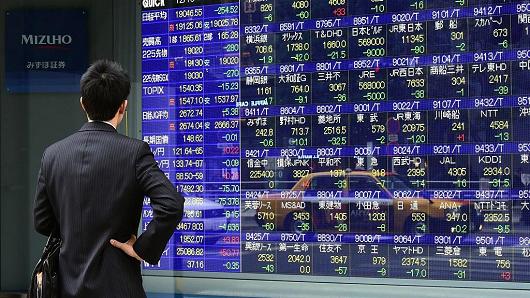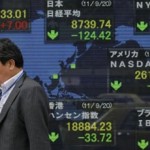Asia Stocks Fall as Oil Rebounds Before Output Talks; Lira Sinks

-
Turkey’s lira extends slide after Moody’s cut rating to junk
-
Crude rebounds ahead of OPEC talks aimed at limiting output
Asian stocks dropped by the most in two weeks and futures foreshadowed losses in European and U.S. equities as investors weighed prospects of major oil producers agreeing output curbs at talks this week. Crude rebounded following its steepest drop in two months and the yen gained.
The MSCI Asia Pacific Index extended the last session’s retreat from a 14-month high as benchmark shares gauges retreated across the region. Oil recouped less than a quarter of Friday’s slump amid indications Saudi Arabia will agree to cut output to January levels when OPEC members and Russia meet Wednesday in Algiers. Turkey’s lira led losses among emerging-markets currencies after Moody’s Investors Service cut the nation’s debt rating to junk. Haven assets including the yen and sovereign bonds rose.

Friday’s plunge in oil prices knocked investor sentiment, which had been improving after central bank meetings in the U.S. and Japan bolstered expectations that monetary policies in the world’s major economies will remain loose. Money managers increased their short positions in crude by the most in more than a year during the week ended Sept. 20, reflecting skepticism that major producers will reach an accord in Algiers after similar discussions in Doha failed in April.
“Oil spot prices will have a big influence on where equities markets are going to trade for the early part of the week,” said Angus Nicholson, a Melbourne-based analyst at IG Ltd. “There are uncertainties over whether the OPEC members can reach an agreement.”
American politics are likely to be high on investors’ minds on Monday as the first of three televised debates between presidential candidates Hillary Clinton and Donald Trump takes place. Central bankers will be fairly active, with speeches due from the head of the European Central Bank, as well as regional Fed chiefs for Dallas and Minneapolis.
Stocks
The MSCI Asia Pacific Index was down 0.9 percent as of 7:13 a.m. London time, after gaining 3.6 percent last week. Hong Kong’s Hang Seng Index fell by the most in two weeks and Taiwan’s Taiex index retreated from a 14-month high.
Chinalco Mining Corp. International jumped as much as 28 percent in Hong Kong after parent company Aluminum Corp. of China Ltd. offered to buy out the unit’s minority shareholders. Hyundai Merchant Marine Co., South Korea’s second-largest container line, surged 5.7 percent in Seoul after the company was said to be looking at some assets of troubled rival Hanjin Shipping Co. for a possible acquisition.
Futures on the Euro Stoxx 50 Index slid 0.5 percent. Contracts on the S&P 500 Index fell 0.2 percent following a 0.6 percent drop in the benchmark on Friday, when U.S. energy stocks slumped as oil sank 4 percent in New York amid speculation the Saudis had dismissed prospects of a deal aimed at stabilizing crude prices.
Commodities
Crude oil rose 0.8 percent to $44.84 a barrel in New York. Algeria’s Energy Minister said Saudi Arabia, the world’s No. 1 oil exporter, has offered to cut production to January levels to help convince other major producers to agree output curbs this week in Algiers.
Gold fell 0.2 percent, after climbing 2.1 percent last week. The precious metal’s price swings may become more severe in the final quarter owing to the U.S. presidential election and an expected interest-rate increase by the Fed, according to Citigroup Inc.
Nickel declined 1.6 percent in London, pulling back from a one-month high. Investors are awaiting the result of an environmental audit in the Philippines, which may close mines in the world’s largest supplier. Copper retreated 0.2 percent from a seven-week high.
Currencies
The MSCI Emerging Markets Currency Index fell by the most in two weeks as most developing-nation currencies lost ground versus the greenback. The Philippine peso slid to a seven-year low as concern about the policies of President Rodrigo Duterte spurs an exodus of foreign capital. Overseas investors were net sellers of the nation’s shares for the 22nd day in a row on Friday.
The lira sank to a seven-week low versus the dollar after Moody’s cut Turkey’s sovereign rating to Ba1 on Friday, citing risks related to the country’s external financing needs and a weakening of credit fundamentals. The decision marked the end of a review following an unsuccessful coup attempt in July.
The Bloomberg Dollar Spot Index was little changed following a 0.6 percent loss last week. The yen strengthened 0.2 percent to 100.87 per dollar.
Former Japanese top currency official Eisuke Sakakibara forecast on Monday that Japan’s currency will slowly strengthen, saying in a Bloomberg TV interview that he wouldn’t be surprised if it reaches 90 by the end of next year. Sakakibara, dubbed “Mr. Yen” for his ability to influence the exchange rate while a senior Ministry of Finance bureaucrat in the 1990s, correctly predicted the currency’s advance this year from near 120 to beyond 100.
Bonds
Australian government debt due in a decade rose for a third session, pushing their yield down by three basis points to 1.97 percent. Rates on similar-maturity New Zealand bonds fell for a fourth day and Japan’s declined for a second session. The Bank of Japan last week shifted the focus of its monetary policy to managing yields and Governor Haruhiko Kuroda said Monday the shape and location of the yield curve will remain broadly where it is.
Benchmark bonds also gained in Germany, Italy and Spain, while U.S. Treasuries were little changed after their yield slid seven basis points last week to 1.62 percent. The Fed refrained from hiking interest rates on Sept. 21 and lowered its projections for the number of increases in 2017 and beyond.
Still, expectations are that U.S. borrowing costs will be raised by the end of December and analysts see the 10-year Treasury yield climbing to 2.2 percent by the end of next year. Foreign central banks havereduced their holdings of U.S. sovereign debt for three consecutive quarters, the most sustained pullback on record, and declines are accelerating, Fed data show. Diam Co., with $168 billion in assets under management, has also been shrinking its positions.
“I’m not confident that central banks will keep loose monetary policy going forward,” said Hajime Nagata, one of the bond investors for the company in Tokyo. Long-term yields may rise around the world, and Diam trimmed its holdings of benchmark Treasuries about a month ago, he said.
Source: Bloomberg





























